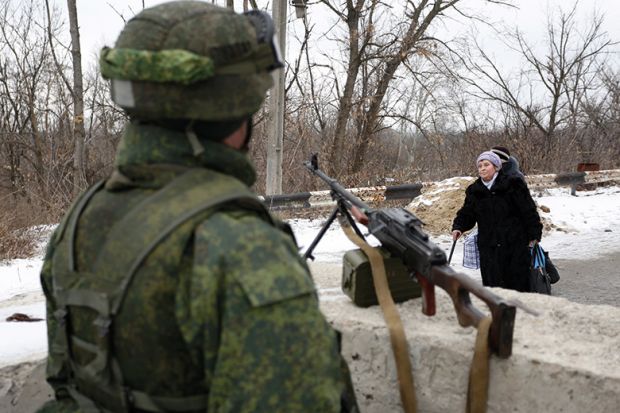The history of international relations can be told in a variety of different ways. One early approach was, through the development of international law and organisations, as a slow story of progress. That fell out of favour with the evident failure of the League of Nations to prevent the Second World War and with the grim stand-offs of the Cold War that paralysed the United Nations. Law and organisations did not stop being important after 1945 – indeed there was a steady widening in their coverage – but growth took place in specialised contexts such as the law of the sea, world trade and standard-setting for human rights. Relations between the great powers seemed to take place on another plane.
It is this narrative that Yale professors Oona Hathaway and Scott Shapiro want to overturn. Theirs is a bold attempt to put international law back centre stage, and in particular to highlight what they see as the unjustly neglected Pact of Peace from 1928, known as the Kellogg-Briand Pact, together with four individuals who unceasingly pursued the pact’s aim of outlawing war as an instrument of policy – three Americans, Salmon Levinson, James Shotwell and Sumner Welles, and one Polish-Jewish exile living in Britain, Hersch Lauterpacht. While accepting its contemporary lack of impact, the authors claim that states came over time to see that what they dub the “Old World Order”, with its wars of conquest, gunboat diplomacy and the view that might equals right, had to be abandoned.
In its place is the principle, even if sometimes honoured only in the breach, that war can be justified solely as self-defence. On this basis, the idealists of the inter-war period should be rehabilitated as far-sighted internationalists who laid the foundations for an interdependent world in which states deal with transgressors by shaming, isolating and imposing sanctions, a process they label “outcasting”. Such progress is always under threat, but the legal and normative shift it represents is, in the view of Hathaway and Shapiro, a break point in the history of international relations more critical than obvious caesuras such as the defeat of Nazism or the end of the Cold War.
This central thread is clearly and consistently argued. But the book contains far more. It is a cornucopia of historical vignettes and digressions, tracing the emergence of international law from the early 17th-century formulations of Hugo Grotius through to the present day. Legal issues and political conflicts are brought vividly to life through a wide range of life stories – some as well known as those of Napoleon Bonaparte and Commander Matthew Parry, but many rescued from the condescension of posterity, such as the Dutch privateer Jacob van Heemskerck or the emissary of revolutionary France to the United States, Edmond-Charles Genêt. The intertwined fates of the intellectual lawyers Hans Kelsen and Carl Schmitt are also rivetingly narrated. The result is an eclectic and deeply researched work that is also notably well written. It weaves together events and ideas over 400 years with rare intellectual brio.
It is the very clarity of The Internationalists that is its main problem. The reader can live with the authors’ Kellogg-Briand conceit. The choice to rehabilitate this single treaty, and to romanticise the men who supported it, is a captivating narrative device if not ultimately convincing, given that the Second World War changed the context for thinking about war so fundamentally. The occasional historical misstep is also forgivable in the light of the mass of material marshalled here. But the central device of the distinction between the Old and New World Orders is too simplistic. It cannot do justice to the multifaceted processes of change that international politics have undergone in the past two centuries, through the industrial revolution, imperialism, world war, decolonisation and the expansion of the international system. It is not that the authors ignore these forces; more that they are overly preoccupied with wars of territory and with their conviction that law has been key to reducing their incidence.
A stress on the decline in wars of conquest raises the problem of how to deal with the fact that collective violence still disfigures life on this planet. Civil wars, terrorism, ethnic cleansing, oppression through hegemony – and indeed still some border-crossing, as in Ukraine – fill the agenda of international politics. Hathaway and Shapiro try to explain this as part of the necessary struggle to consolidate the Peace Pact paradigm, and assume optimistically that war is dying out rather than just changing in nature. They do so, while acknowledging that the decline in territorial acquisitiveness might have multiple causes, by putting most of the weight on the changing norms embodied by Kellogg-Briand. They skate over the long tradition of writing in international relations, starting with E. H. Carr in 1939, about how ideals and law-making must be combined with an understanding of political realities if they are not to create more disorder than they resolve.
The very idea of international order based on states is increasingly called into question by those impatient to see progressive change. Hathaway and Shapiro are not among their number. They are sensitive to the huge human damage always inflicted by war, and to the power of states to inflict it. So they rightly celebrate any signs of violent conflict coming under control. In this sense their book is both decent and old-fashioned, harking back in more ways than one to the preoccupation of the 1920s with the “war to end wars”. As a result, while making heroic efforts to cover every angle, they find it difficult to account for the persistence of spheres of influence (Hitler’s Grossraum), the use of proxy wars or the many other ways by which the strong still subvert the sovereignty of the weak.
Intervention has its positive side, barely acknowledged here, represented by the doctrine of the Responsibility to Protect – endorsed by the UN in 2005 – and the argument that military power may be required to stop genocide. This presents a big problem for the view that only self-defence can justify the use of force, although a UN Security Council Resolution helps legitimacy. Other difficult issues are those of collective security and deterrence. It seemed immoral to inter-war pacifists to threaten war to prevent war, just as many now cannot stomach the idea that we might achieve peace by threatening to annihilate millions with nuclear weapons. But in a world of sovereign states with highly varied outlooks and capabilities, these are arguments that need confronting.
Putting aggressive war outside the law has been a major civilising achievement. Those who fought for it deserve every credit. But it is only one aspect of the slow building of a sense of shared responsibility for an orderly world – without which the pursuit of justice will sink beneath competing hatreds and ideologies. The principle of diplomatic immunity, the emergence of summit meetings, the proliferation of institutions, democracy, regional cooperation, and even the rise of international relations as a serious field for academic enquiry, have also contributed to making world politics a more constrained and sophisticated field of action than in the 18th-century heyday of the balance of power. Peace may not have broken out, but in this sense at least, internationalism is winning.
Christopher Hill is Wilson E. Schmidt professor at SAIS Europe in Bologna, and emeritus professor of international relations, University of Cambridge.
The Internationalists and Their Plan to Outlaw War
By Oona A. Hathaway and Scott J. Shapiro
Allen Lane, 608pp, £30.00
ISBN 9780241200704
Published 12 September 2017


The authors
Oona A. Hathaway, the Gerard C. and Bernice Latrobe Smith professor of international law at Yale Law School, was born and grew up in Portland, Oregon. Studying government at Harvard University, she says, “opened up the world” to her and inspired an interest in “the intersection of domestic and international politics”. She then went to Yale Law School, where she “learned how to think like a lawyer and began to consider about how law might play a role in answering the questions that I had first explored as an undergraduate”.
Scott J. Shapiro, Charles F. Southmayd professor of law and professor of philosophy at Yale Law School, lived in Paterson, New Jersey until the age of 16, which he describes as “a miserable place in which to grow up”. Going to Columbia College allowed him to discover New York City and philosophy.
When they began working together, Hathaway had already written about how human rights treaties often failed to “make a difference”, and so she was “interested in cases where international law did work” – and wanted to understand why it worked. Shapiro was fascinated by how international law “presented many of the key puzzles about the nature of law that I had long struggled with, but in a very different context”.
The story of “the internationalists” they have uncovered, they explain, is centred on four men who “worked with one another and with a vast array of grass-roots groups, politicians, academics, government bureaucrats and international colleagues to make progress”. None of them is a household name or held high political office. Yet this is precisely why their example “teaches us that we have an opportunity and a burden. Each of us, even those of us far outside the halls of government, has the capacity to make a difference…Together we can and must continue to support institutions that have kept the peace, adapt them to changing circumstances and develop new ones that will further reduce violence.”
Matthew Reisz
POSTSCRIPT:
Print headline: The rules of engagement
Register to continue
Why register?
- Registration is free and only takes a moment
- Once registered, you can read 3 articles a month
- Sign up for our newsletter
Subscribe
Or subscribe for unlimited access to:
- Unlimited access to news, views, insights & reviews
- Digital editions
- Digital access to THE’s university and college rankings analysis
Already registered or a current subscriber? Login




